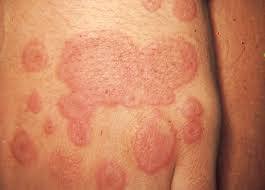Skip to main content
Rheumatic Fever (manifestation,Diagnosis,Investigations and Treatment)
Rheumatic Fever
It is an autoimmune response to a bacterial infection, associated with streptococcal
infections, usually affecting children, characterized by fever, swelling and pain in the joints,
sore throat, and cardiac involvement (rheumatic heart disease), typically leave no lasting damage
to the brain, joints or skin.
Symptoms: not all strep throat infection (bacterial infection, make your throat feel sore) result in
RF, and RF symptoms occur 2-4 weeks after a strep throat diagnosis
Strep throat characterized by a sore throat with swelling, joint pain, rash, fever/ temperature over
100 degree Fahrenheit (38C), nausea, vomiting, nodules or bumps under the skin, nose bleeds,
fatigue, heart palpitation or flutters, and shortness of breath
Clinical picture:
Major manifestation:
- Polyarthritis (affect big joints/ leave the joint completely free) starts in the larger joints,
such as the knees, ankles, wrists, and elbows, before moving to other joints. This
inflammation normally resolves within 4-6 weeks, without causing permanent damage.
- Rheumatic Carditis ( inflammation of the heart muscle and heart tissue, can cause a rapid
heart rate, fatigue, shortness of breath and exercise intolerance)
- Erythema marginatum (redness /patches of erythema on the trunk/arms)
- Subcutaneous nodules.( painless nodules present over bony prominence)
- Chorea ( abnormal involuntary movement disorder/ rapid movements in face and arms)
(affect females more than males / appears late after infection by 6 months)
Minor manifestations:
- Fever, with or without arthralgia (pain in a joint)
- Previous attack
- Elevated inflammatory marker: High ESR (done To detect the presence of inflammation)
and ASO (done To help determine whether you have had a recent strep infection with the
bacteria)
- Positive CRP (C-reactive protein is a substance produced by the liver in response to
inflammation. can also indicate that there’s inflammation in the arteries of the heart,
which can mean a higher risk of heart attack.)
- Prolonged PR interval in ECG
Diagnosis:
Diagnosis of RF must be established by the presence of two major manifestations or one major
and two minor manifestations.
Investigations:
- ESR (Erythrocytic sedimentation Rate) is high
- ASO or ASLO (Anti Streptolsin O Titre) is high
- CRP is positive
- ECG: sinus tachycardia, /Prolonged PR, QT interval
- Complete blood count CBC: RBCs and hemoglobin: anemia
- Echo: Valvular stenotic lesions, especially of the mitral valve, can be observed in
rheumatic heart disease.
Treatment:
Goal: relieve symptoms, control inflammation and prevent the condition from returning.
-Medication:
- Antibiotics, Anti-inflammatory treatment: for treatment / prevention
- After completing the full antibiotic treatment, your doctor will begin another course of
antibiotics to prevent recurrence of rheumatic fever. The anti-inflammatory drugs are not
usually required for more than 4-8 weeks, but Patients with ARF(acute) need prolonged
antibiotic prophylaxis to prevent recurrent attacks
- Pain medications & corticosteroids: to address inflammation
- Anticonvulsant medications: to treat involuntary movements
- Diuretics and vasodilators are the mainstays of therapy. Monitor for development of
arrhythmias in patients with active myocarditis.
-Diet
No specific dietary recommendation exists. CHF may require salt restriction.
-Restricted activities and bed rest (depending on the severity)
Bed rest is especially important in those with carditis. Patients are typically advised to rest
through the acute illness and to then gradually increase activity; some clinicians monitor the ESR
and restart activity only as it normalizes
-Close follow-up is mandatory.
Prevention
- Preventing strep throat will help prevent Rheumatic fever
- One of the best means for prevention is to wash hands thoroughly and frequently especially
during the cold and flu season
- Alert your health provider if there is a family history of RF
Prognosis
- The prognosis of ARF has been improved by preventing recurrent attacks with secondary
antimicrobial prophylaxis. The ultimate prognosis of an individual attack is related directly to the
severity of cardiac involvement during the acute phase.
- However, the overall prognosis is worse in those with severe carditis
- Few of patients during their attack of ARF have an audible heart murmur

